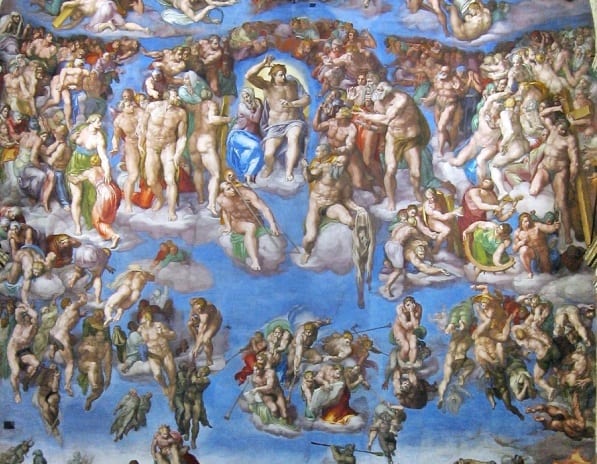
Luke 21 can be examined parallel to Mark 13 and Matthew 24. These chapters contain Jesus’ eschatological discourse since it deals with the end of the world (the eschaton) and the events which will precede it. All three chapters begin with Jesus’ prediction of the destruction of the Temple in Jerusalem. The first century Christians believed that the end of the world was imminent, and this is evident in Mark’s Gospel, which was written shortly before 70 AD; it described the destruction of the Temple by the Romans (Mark 13:14) as the apocalyptic symbol which accompanies the end of the world and the Second Coming of Christ. That is quite understandable; imagine being in Jerusalem when the Roman legions were amassing around the city. No one can come in or out the city gates. Day by day, an atmosphere of impending doom hung over the inhabitants of Jerusalem.
However, Luke’s Gospel, which was written around two decades later than Mark and after the destruction of the Temple, took into account the delay of the Parousia by adding what he called “the time of the Gentiles” (Luke 21:24). According to Luke, this is the time period after the destruction of the Temple and before the Second Coming of Christ.
There are many different interpretations to the apocalyptic messages in scripture, but we should not lose sight of Jesus’ exhortation to be vigilant:
Beware that your hearts do not become drowsy from carousing and drunkenness and the anxieties of daily life, and that day catch you by surprise like a trap. For that day will assault everyone who lives on the face of the earth. Be vigilant at all times and pray that you have the strength to escape the tribulations that are imminent and to stand before the Son of Man. (Luke 21:34-36; cf. Mark 13:32-37, Matthew 24:36-44)
Ultimately, the message is this: although there will be warning signs, the end of the world will come as a surprise for many. Christians must be vigilant and pray at all times so that we can have the spiritual strength to live through the tribulations and to stand before the judgment seat of Christ.
The question that we can ask ourselves is: How must I prepare myself? Obviously, preparation takes time, so the first thing is to take the time to prepare, whether through prayer, reflection, reception of the sacraments or some other means. As we reflect on our lives, is there something that if left undone, would deprive me of peace? These are the things that we must address before it is too late. Some of these major things pertain to forgiveness and reconciliation.
Finally, do we trust God enough? How many times have we wanted to take control of something that we really have no control over? How many times have we forced things out of pride or impatience? These are all signs of lack of trust in God. Our loving God does not want the kind of perfection in which we are right all the time, because that tends to make us prideful, arrogant or make us not need Him. Rather, He wants us to be perfect in being just, in mercy and in humility. Micah 6:8 is not just great advice on how to prepare for the Second Coming of our Lord; it is also great advice on how to live our lives each and every day: You have been told, O mortal, what is good, and what the LORD requires of you: Only to do justice and to love mercy, and to walk humbly with your God. (Micah 6:8).